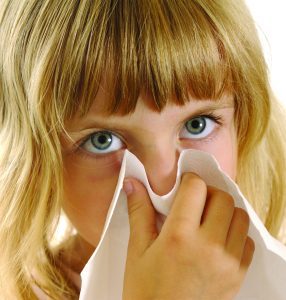Dr. Lou Romig, Medial Director,
After Hours Pediatrics Urgent Care sister company to EPN Urgent Care Naples
 After a severe storm or hurricane, there are common pediatric complaints seen in emergency departments as a result of the weather experienced. Children with seasonal and environmental allergies may have acute allergy symptoms, sometimes severe, and children with asthma/reactive airway disease can have attacks of wheezing and trouble breathing. This is due to high winds that can cause unusual types and amounts of pollen and other allergens to be in the air and deposited on surfaces. In addition, flooding can cause the proliferation of mold, which can be highly allergenic (causing allergy symptoms). Children with allergies and asthma who are on daily medications to prevent allergy symptoms (such as loratidine, cetirazine, montelukast or inhaled oral/nasal steroids) should continue those medications and those who are not taking them might benefit from starting them after a storm.
After a severe storm or hurricane, there are common pediatric complaints seen in emergency departments as a result of the weather experienced. Children with seasonal and environmental allergies may have acute allergy symptoms, sometimes severe, and children with asthma/reactive airway disease can have attacks of wheezing and trouble breathing. This is due to high winds that can cause unusual types and amounts of pollen and other allergens to be in the air and deposited on surfaces. In addition, flooding can cause the proliferation of mold, which can be highly allergenic (causing allergy symptoms). Children with allergies and asthma who are on daily medications to prevent allergy symptoms (such as loratidine, cetirazine, montelukast or inhaled oral/nasal steroids) should continue those medications and those who are not taking them might benefit from starting them after a storm.
Children assisting with post-storm clean-up around the home can be exposed to allergens through contact with plant/tree debris and contaminated surfaces. Children with severe allergies or asthma should not participate in these activities or should wear masks while assisting other family members.
Some children are dependent upon powered nebulizer machines to treat their asthma/reactive airway disease. Unfortunately, loss of power is a common problem during and after storms. Albuterol, the medication used for acute wheezing and wheezy cough can be given quite effectively to even very young children using a metered dose inhaler and spacer chamber with a mask or mouthpiece. This equipment does not need power, is very portable and very easy to use. Ask your primary care provider about obtaining an albuterol inhaler and spacer chamber if your child uses albuterol via nebulizer.
In communities severely affected by a storm, pharmacies may not be open or easily accessible for days to weeks. Part of a family’s hurricane preparations, both before the season starts and when a storm is forecasted to possibly affect their area, should include ensuring all family members have a sufficient supply of their prescriptions and over-the-counter medications to last for two weeks after a storm. In the state of Florida, the law requires that insurance companies approve and pay for early refills on prescription medications when the patient’s county of residence is under a hurricane warning and the Governor has designated the county/state is in a state of emergency. This applies only when the prescription has refills available. It is best NOT to wait until your area is under a hurricane warning to get additional medications but the law can help if necessary.
Post-storm pediatric illness and injury is predictable, and by being prepared, we can enhance the level of medical care available to children after a storm.
6400 Davis Blvd #103, Naples, FL 34104
(239) 775-2300









